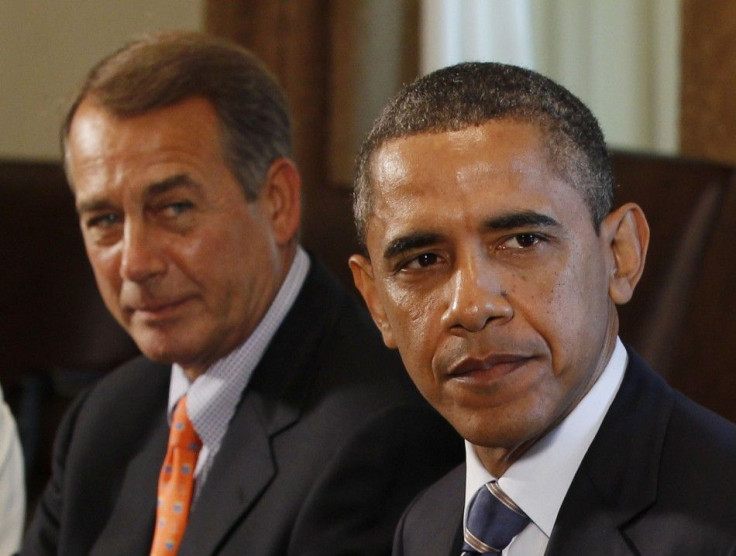Obama Becoming Conservative Over Budget Cuts

With the heavy political headwinds of high unemployment, a slow growth economy, and global debt concerns blowing in his re-election face, President Barack Obama is suddenly sounding more serious on America's debt issue than some key Republicans.
He's reaching for a very big cuts number, according to White House chief of staff Bill Daley, who maintains the President is attempting to reach a big deal with Republicans in budget negotiations, ongoing at the White House Sunday.
Everyone agrees, said Daley, in an interview with This Week anchor Christiane Amanpour, that a number around $4 trillion is the number that will make a serious dent on our deficit. It will send a statement to the world that the U.S. has gotten hold of their problems, fiscal problems, and they're moving forward. And it'll give confidence to the American people, give confidence that we can then move forward over the next number of years to bring economic soundness.
Obama has been targeted by conservatives, particularly in last year's mid-term congressional elections, for allowing America's debt to spiral out of control in the nation's recovery from the Great Recession of 2008-2009. Tackling the debt issue was one of the chief concerns among the emergent Tea Party and other Republicans who found widespread support for the cause in the mid-term elections.
But just Saturday night, before Daley's comments, Speaker John Boehner, a Republican, said a small agreement on cutting the debt might be best route at the moment. Boehner said in a statement released to the media that Republicans and Democrats were having difficulty reaching agreement because of differences each side held over tax revenues. Boehner said he was seeking a smaller deal on budget cuts in bipartisan negotiations that continue, and also involve the Obama administration.
I believe the best approach may be to focus on producing a smaller measure, based on the cuts identified in the Biden-led negotiations, that still meets our call for spending reforms and cuts greater than the amount of any debt limit issue, Boehner said in the statement.
Daley, however, was talking a different line Sunday morning, positioning President Obama in a decidedly conservative stance when it comes to budget cuts.
It's rather unfortunate that the speaker has made the comments he has, Daley told Amanpour. The president is still very committed to solving this deficit problem for the future of America. He's looking forward to the meeting today to lay out once again his case.
Daley said he believes an agreement will be reached prior to an early August deadline when America's debt ceiling must be raised or the U.S. would default on its debt obligations. The U.S. is currently near its allowed debt ceiling of $14 trillion.
According to Daley, Obama's stance now is that every side must suffer pain politically to make cuts needed, and changes must include cuts to Medicare -- something many Democrats oppose. The Obama administration is apparently pushing ahead on that tactic during the negotiations, Daley said.
Medicare has got to be strengthened, he told Amanpour. It'll run out of money in five years if we don't do something. Obviously there has to be improvements to it. There has to be at the same time a balanced package.
Daley touched on why the President is pushing for such a large deficit cut at this stage, noting he thinks uncertainty about political progress in the debt negotiations has only contributed to the sluggish economy.
If I were a business owner trying to make a decision on an investment, I'd have a little concern right now, Daley said.
© Copyright IBTimes 2024. All rights reserved.











